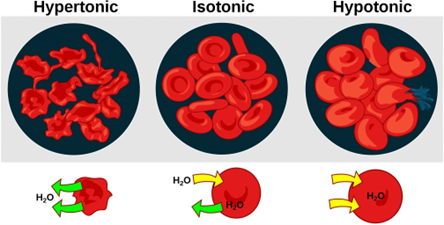The nurse is caring for a client who requires IV fluids. which IV fluid type would be considered a hypertonic solution?
Tonic
Hypertonic
Hypotonic
Isotonic
The Correct Answer is B
Hypertonic solutions have a higher concentration of solutes (such as sodium, glucose, or mannitol) than the fluid in the body's cells, causing water to move out of the cells and into the bloodstream. This results in the shrinking of the cells and an increase in extracellular fluid volume.
Examples of hypertonic solutions include 10% dextrose in water (D10W), 3% saline, and 5% dextrose in 0.9% saline.
In contrast, isotonic solutions have the same concentration of solutes as the fluid in the body's cells, and hypotonic solutions have a lower concentration of solutes than the fluid in the body's cells.
Therefore, in this scenario, the nurse should administer a hypertonic solution to the client who requires IV fluids.
Nursing Test Bank
Naxlex Comprehensive Predictor Exams
Related Questions
Correct Answer is D
Explanation
Explanation: The normal range of sodium (Na+) in the blood is 135-145 mEq/L. The patient's sodium level of 121 mEq/L is below the normal range, indicating a low sodium level, which is called hyponatremia.
Hyponatremia is a common electrolyte imbalance that can be caused by a variety of factors, including excessive sweating, vomiting, diarrhea, certain medications, kidney disease, and hormonal imbalances. It can cause symptoms such as nausea, headache, confusion, seizures, and coma, and it can be a medical emergency if the sodium level drops rapidly or severely.
Correct Answer is B
Explanation
During exercise, the heart has to work harder to pump blood and oxygen to the muscles. In patients with stable angina, there is a partial blockage of the coronary arteries, which reduces blood flow and oxygen delivery to the heart muscle. This lack of oxygen to the heart muscles causes chest pain or discomfort, which subsides when the patient stops exercising and is relaxed.
Therefore, it is important for the patient with stable angina to avoid activities that trigger chest pain, take prescribed medications, and make lifestyle modifications to manage their condition.

Whether you are a student looking to ace your exams or a practicing nurse seeking to enhance your expertise , our nursing education contents will empower you with the confidence and competence to make a difference in the lives of patients and become a respected leader in the healthcare field.
Visit Naxlex, invest in your future and unlock endless possibilities with our unparalleled nursing education contents today
Report Wrong Answer on the Current Question
Do you disagree with the answer? If yes, what is your expected answer? Explain.
Kindly be descriptive with the issue you are facing.
